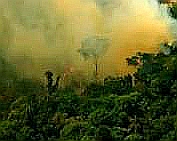
On May 8-9, 2008, the Seminar “What Brazil and What Amazonia Does the World Need?” was held in Rio de Janeiro, Brazil. It was organized by IBASE and the FnWG and attracted some 30 actors from different fields around the region to discuss the question of governance in Amazonia.
The Amazon basin is the object of a constant struggle: on the one hand, there is a desire to exploit its natural resources and on the other, the need to preserve its biological and human diversity. Above all else, it is a vital region in terms of the survival of our planet. However, there is another important issue to consider. When it comes to destiny, to our destiny, Amazonia is also a territory in and around which new perspectives are forming, along with new kinds of collective management and new political responses to the crisis of governance that the world is facing today. During the 21st century, the question of “good governance” in Amazonia is a major challenge for all humanity.
The series of videos presented here are the result of interviews held with Moema Miranda from the NGO Ibase in October 2009.
What Brazil and Amazonia Does the World Need?
A short film that presents the seminar
3'45/version with English subtitles
Amazonia Today
2'45 /version with English subtitles
In this brief introduction, Moema Miranda offers a short summary of the global importance of the Amazonian rain forest. She then discusses the role of Amazonia in Brazil today. As a country, Brazil is still influenced by the rules of European colonialism but its presence, like that of other emerging countries, is growing stronger in the international arena.
Deepening Dialogue and Reflection
3'45 / version with English subtitles
Two important processes have enlivened the debates on Amazonia. These are what sparked the seminar “What Brazil and Amazonia Does the World Need?”: the preparations for the World Social Forum 2009 in Belém, Brazil (in the heart of Amazonia), and a broader process of reflection on world governance organized by the Charles Léopold Mayer Foundation for the Progress of Humankind (FPH). Moema argues that current perspectives on governance are limited because they are based on the current hegemonic capitalist model. In this context, it is critical to discuss and rethink the limits of our perspectives on governance models in order to forge new paths: the goal is to reestablish dialog and open the debate for everyone to think about these issues, build a new political culture, and turn our diversities into advantages.
Multiple Strategies
4' / version with English subtitles
What can we actually do to make this qualitative leap? One approach is to begin by seeking out local initiatives and alternatives around the world and making them visible, connecting them and emphasizing their “new” aspects. There is no single answer to the challenges of the twenty-first century: instead, there are a great number of responses that we must consider in order to establish common agendas worldwide. Reconstructing collective action is the way to find the answers we need.
Series of Radical Transformations
7'15 / version with English subtitles
What Brazil do we, Brazilians, want for ourselves? A Brazil that has its place in the major league, with offices at the United Nations? Or a Brazil that will invent something new, something very different from the order established by the current model? The rules of the game will not be changed overnight. It will be necessary to come up with new concepts, organize the political struggle and construct ourselves as social beings. We are the builders of our destiny, says Moema, God no longer exists and we are the ones responsible for the chaos sparked by economic globalization.